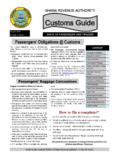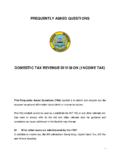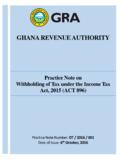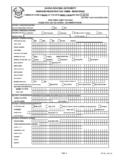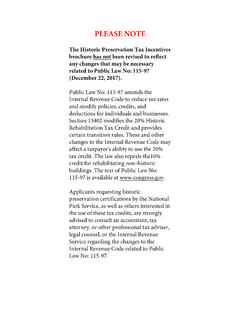Transcription of TAX INCENTIVES - GRA
1 TAX INCENTIVES Tax INCENTIVES are concessions, provisions and conditions made available to taxpayers and to serve as: a) motivations and encouragement b) means of reducing the tax liability and also lessens the tax burden on taxpayers Types of INCENTIVES 1. Incomes Exempted 2. Tax Holidays / Exemption Periods 3. Tax Rates 4. Reliefs 5. Expenses (Deductions Allowed) 6. Carry over of losses 7. Tax Rebates 8. Capital Allowances 9. Settlement of Disputes 10. Dividends 11. Free Zones 1. Income Exempted In an attempt to give INCENTIVES to taxpayers a number of incomes have been exempted from tax. The page on exemption has detailed information on incomes exempted from tax. 2. Tax Holidays (Exemption Periods) Some businesses are granted tax holidays or exemptions periods. These include farming, processing businesses as well as agro processing business.
2 The rest are Rural Banks, Real Estates Developers, Ghana Stock Exchange and Free Zones. 3. Tax Rates The tax rates for individuals mainly employees and self-employed persons, companies as well as bodies of persons as indicated in the page on Tax Rates also serve as types of INCENTIVES to taxpayers. i. Individual Tax Rates With regards to the individual tax rates, the marginal tax rate is the same for employees and self-employed persons. The marginal rate in the year 2000 was GH 90. This was revised to GH 120 in the year 2001 and was again increased to GH 150 in the year 2004 to date. Similarly, the top marginal rate has been raised from GH 4,800 and above at a rate of 30% to GH 9,600 and above at the rate of 25% in the year 2004 to date. ii. Company Tax Rate Company tax rate at present is 25%. However, concessionary rates are enjoyed by some businesses. The income tax rate applicable to a company engaged in the hotel industry is 22% and that of export of Non-traditional goods is 8%.
3 Companies listed on the Ghana Stock Exchange are taxed at 22%. Concessionary rate of 20% is enjoyed by Financial Institutions that derive their incomes from loans granted to Farming Enterprises and Leasing Companies. iii. The Rate for Bodies of Persons The income tax rate applicable to bodies of persons is 25%. 4. Tax Reliefs Tax reliefs are granted to individuals so as to lessen their tax burdens. Some reliefs are now granted upfront. The details could be obtained from the page on Reliefs. 5. Deductions Allowed / Expenses All expenses made in relation to the production of the income from any business, employment or investment is allowed or deducted in respect of: i. The expenses wholly, exclusively and necessarily incurred in the production of the income ii. Any other deductions as may be allowed by the Minister of Finance. Deductions Allowed i. Interest on Loans ii. Rent iii.
4 Repairs iv. Deductions in relation to Rental of premises v. Bad Debts vi. Research and Development Expenditure vii. Capital Allowance viii. Foreign Currency Exchange Losses ix. Carry Over of Losses (Restricting to farming, manufacturing, mining, agro processing, tourism, ICT industries (Software), venture capital financing companies) 6. Carry Over of Losses For the purposes of ascertaining the income of a person from farming, mining, or manufacturing business which mainly produce for export, the losses incurred can be carried over or deducted for five years. 7. Tax Rebates (location Tax INCENTIVES ) Manufacturing business which is located outside Accra / Tema enjoys tax rebate as follows: Location Rebate Regional Capitals Elsewhere in Ghana 25% 50% 8. Capital Allowance Capital allowance is a deduction allowed and it is granted in respect of depreciation of assets used in the course of production of the income by enterprises.
5 9. Settlement of Disputes The Commissioner is the first appellate authority. Thereafter appeals can be made to the courts as far as Supreme Court for settlement of disputes. 10. Dividends Dividends are taxed at the rate of 8% and it is a final tax. 11. Free Zones The Free Zones Act 504 provides tax holiday of 10 years for companies operating in areas demarcated as Free Zones. Thereafter Corporate tax is paid at the rate not above 8%.

